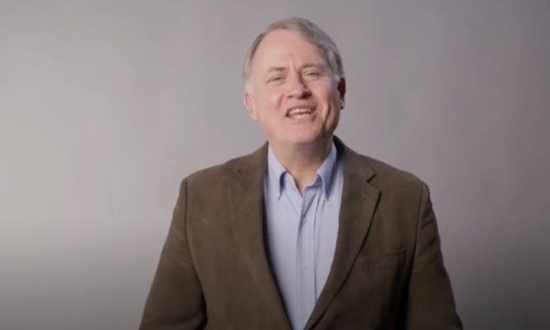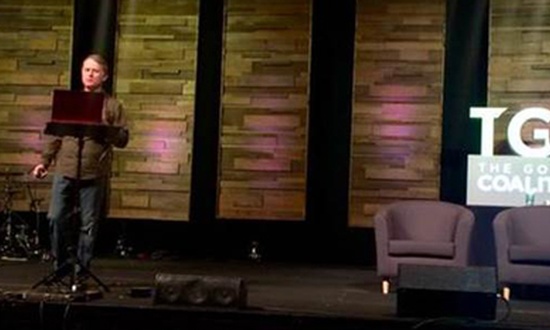Eugene Peterson captures the universal implications of Christ’s redemption when he paraphrases Colossians 1:18-20 in The Message: “He was supreme in the beginning and—leading the resurrection parade—he is supreme in the end. From beginning to end he’s there, towering far above everything, everyone. So spacious is he, so roomy, that everything of God finds its proper place in him without crowding. Not only that, but all the broken and dislocated pieces of the universe—people and things, animals and atoms-get properly fixed and fit together in vibrant harmonies, all because of his death, his blood that poured down from the Cross.”
The power of Christ’s resurrection is enough not only to remake us, but also to remake every inch of the universe—mountains, rivers, plants, animals, stars, nebulae, quasars, and galaxies. Christ’s redemptive work extends resurrection to the far reaches of the universe. This is a stunning affirmation of God’s greatness. It should move our hearts to wonder and praise.
Do you ever sense creation’s restlessness? Do you hear groaning in the cold night wind? Do you feel the forest’s loneliness, the ocean’s agitation? Do you hear longing in the cries of whales? Do you see blood and pain in the eyes of wild animals, or the mixture of pleasure and pain in the eyes of your pets? Despite vestiges of beauty and joy, something on this earth is terribly wrong. Not only God’s creatures but even inanimate objects seem to feel it. But there’s also hope, visible in springtime after a hard winter. As Martin Luther put it, “Our Lord has written the promise of the resurrection not in books alone, but in every leaf in springtime.” The creation hopes for, even anticipates, resurrection. That’s exactly what Scripture tells us:
The creation waits in eager expectation for the sons of God to be revealed. For the creation was subjected to frustration, not by its own choice, but by the will of the one who subjected it, in hope that the creation itself will be liberated from its bondage to decay and brought into the glorious freedom of the children of God.
We know that the whole creation has been groaning as in the pains of childbirth right up to the present time. Not only so, but we ourselves, who have the firstfruits of the Spirit, groan inwardly as we wait eagerly for our adoption as sons, the redemption of our bodies. (Romans 8:19-23)
The “redemption of our bodies” refers to the resurrection of the dead. Paul says that not only we but “the whole creation” awaits the earthwide deliverance that will come with our bodily resurrection. Not only mankind in general but believers in particular (those with God’s Spirit within) are aligned with the rest of creation, which intuitively reaches out to God for deliverance. We know what God intended for mankind and the earth, and therefore we have an object for our longing. We groan for what creation groans for—redemption.
God subjected the whole creation to frustration by putting the Curse not only on mankind but also on the earth (Genesis 3:17). Why? Because human beings and the earth are inseparably linked. And as together we fell, together we shall rise. God will transform the fallen human race into a renewed human race and the present Earth into the New Earth.
What does it mean that creation waits for God’s children to be revealed? Our Creator, the Master Artist, will put us on display to a wide-eyed universe. Our revelation will be an unveiling, and we will be seen as what we are, as what we were intended to be—God’s image-bearers. We will glorify him by ruling over the physical universe with creativity and camaraderie, showing respect and benevolence for all we rule. We will be revealed at our resurrection, when our adoption will be finalized and our bodies redeemed. We will be fully human, with righteous spirits and incorruptible bodies.
John Calvin writes in his commentary on Romans 8:19, “I understand the passage to have this meaning—That there is no element and no part of the world which is being touched, as it were, with a sense of its present misery, that does not intensely hope for a resurrection.”
What is “the whole creation” that groans for our resurrection? The phrase appears to be completely inclusive of “the heavens and the earth” that God created in the beginning (Genesis 1:1). So it is the heavens and the earth that eagerly await our resurrection. This includes Earth and everything on it, as well as the planets of our solar system and the far reaches of our galaxy and beyond. If it was created, Paul includes it in “the whole creation.”
Why does the creation wait eagerly for our resurrection? For one simple but critically important reason: As mankind goes, so goes all of creation. Thus, just as all creation was spoiled through our rebellion, the deliverance of all creation hinges on our deliverance. The glorification of the universe hinges on the glorification of a redeemed human race. The destiny of all creation rides on our coattails.
The Pains and Promise of Childbirth
It’s fair to say that most Christians believe there will be no carryover into Heaven of our present culture, art, technology, or the products of human creativity. Indeed, it’s common to doubt if we will even remember our lives on Earth or the people whom God used to influence and shape us, including our families and closest friends.
If our assumptions about the end of the world were correct, what analogy would we expect Paul to use for what will happen to creation? An old man dying? A mortally wounded soldier gasping his final breaths? Those images would fit well with a belief that the universe will come to a violent, final end. But Paul doesn’t use analogies of death and destruction. He uses the analogy of childbirth: “The whole creation has been groaning as in the pains of childbirth right up until the present time” (Romans 8:22).
There are pains in childbirth for mother and child, but the result is a continuation, a fulfillment of a process that has long been underway. The pains of childbirth are analogous to the present sufferings of mankind, animals, and the entire universe. But those sufferings are temporary because of the imminent miracle of birth. A far better world will be born out of this one, and a far better humanity will be born out of what we now are.
The fallen but redeemed children of God will be transformed into something new: sinless, wise stewards of the earth. Today the earth is dying; but before it dies—or in its death—it will give birth to the New Earth. The New Earth will be the child of the old Earth, just as the new human race will be the children of the old race. Yet it is still us, the same human beings, and it will also be the same Earth.
Romans 8 contains a powerful theology of suffering. There’s the groaning of those dying without hope, and in contrast, the groaning of those in childbirth. Both processes are painful, yet they are very different. The one is the pain of hopeless dread, the other the pain of hopeful anticipation. The Christian’s pain is very real, but it’s the pain of a mother anticipating the joy of holding her child.
It is no coincidence that the first two chapters of the Bible (Genesis 1-2) begin with the creation of the heavens and the earth and the last two chapters (Revelation 21-22) begin with the re-creation of the heavens and the earth.
All that was lost at the beginning will be restored at the end. And far more will be added besides.
Browse more resources on the topic of Heaven, and see Randy’s related books, including Heaven.
Photo: Unsplash




